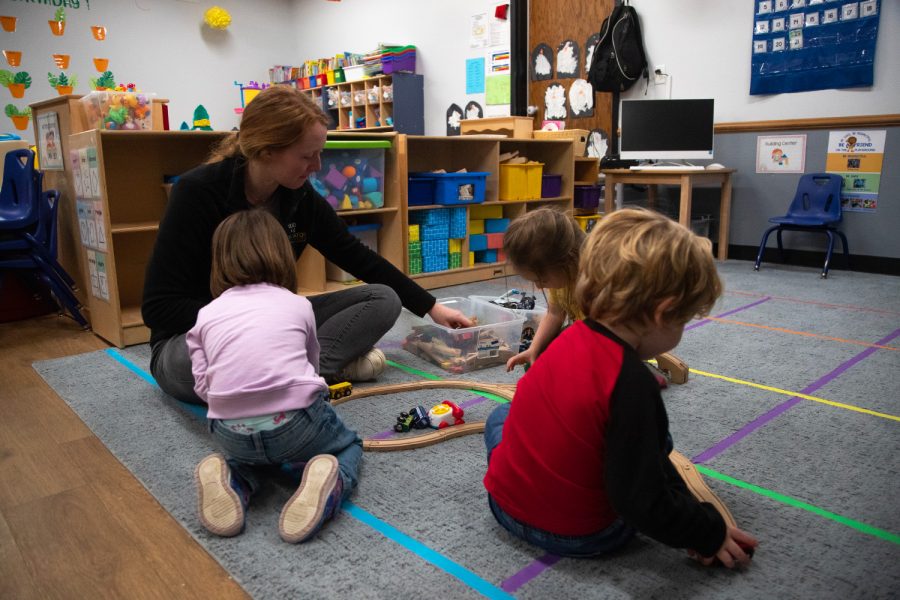Child care centers hopeful, yet cautious of Johnson County Wage Enhancement Program
Qualifying and approved child care employees could receive an added $2 an hour to their wages by April, but the pilot program may not serve all who are eligible.
Hannah Hudson plays with trains with children at Lionheart Early Learning on Wednesday Feb. 22, 2023. Hudson is a childcare provider who could be impacted by the Johnson County Wage Enhancement program, which will be implemented in April.
February 26, 2023
Over 100 child care workers in Johnson County are being offered a slight raise in a new program to address low retention. After the program’s development, some child care workers are feeling left with more questions than answers.
The county Wage Enhancement Program, which is set to be implemented by April 1, offers 150 full-time child care employees who work with children 5 years old and younger an additional $2 an hour at certain child care centers. To be eligible, centers must be licensed in Johnson County and in good standing with the Iowa Department of Health and Human Services.
Iowa City Mayor Pro Tem Megan Alter said she is excited the city is using some of its American Rescue Plan Act dollars allocated for economic development to help the child care workforce.
The American Rescue Plan Act is a $1.9 trillion relief package intended to help U.S. communities financially harmed by the COVID-19 pandemic.
“These are not babysitters,” Alter said. “It’s important that we treat the profession like it is, call it as it is, and pay as it needs be.”
But despite the proposed aid, some child care centers have concerns about what the program will mean for their services.
Vickie Brandenburg, the owner of Lionheart Early Learning Center, a child care facility eligible for the program, said while she thinks the program has the potential to help, she is also worried about the possible consequences of it having a limited capacity.
“It’s a great idea, but what happens in three years if there’s no funding?” Brandenburg said. “You’ve given employees an increase for three years, and now you’re going to take that away. What happens then?”
Even with her concerns, Brandenburg stressed the importance of paying child care employees more. Assistant teachers at Lionheart earn anywhere from $12-15 an hour while teachers make $14-19, Brandenburg said.
In response to concerns, Johnson County Social Services Director Lynette Jacoby said the program is a result of feedback from centers and that the county has hosted listening and Q&A sessions with child care center directors and administrators.
“This is a pilot program,” Jacoby said. “If we are successful and there’s a high demand for it, then I think that’s a big selling point for us to work hard to find a way to secure additional dollars so we can enroll more centers and more child care providers in this program.”
Alter said the program will impact people beyond the child care community.
“There’s this ripple effect that, it’s like, it hits education as well as the economics of the family, as well as if there are less people in the workforce then that impacts the community,” she said. “There’s so many ways in which this is foundational for the health of the community, not just the individuals who need child care.
Employees must work a minimum of 32 hours a week year-round with children ages 5 years old and younger and earn $23 an hour or less. The program doesn’t apply to before- and after-school care or caretakers of school-aged children.
The City of Iowa City and Johnson County are each investing $250,000 a year for a combined total of $1.5 million to fund the program for its initial three-year duration.
RELATED: Johnson County parents struggle to find accessible child care
The city is also asking Iowa City area businesses to contribute $150 per year per employee to sponsor and prolong the program. The Childcare Coalition Charitable Giving Fund through the Community Foundation of Johnson County is also available for businesses to donate to the program.
Jacoby said the program intends to raise employees’ wages without impacting the cost of care for parents, which is on average $282.78 per week.
“That comes out to $14,705 annually for an infant, which far exceeds the cost of in-state tuition for a UI student,” Jacoby said.
According to a presentation on the Iowa City Business Partnership’s website, child care in Johnson County costs 25 percent of a family’s total household income.
Despite these high costs, child care work remains among the lowest-paid professions, as the average child care worker in Iowa earns about $22,067 annually, according to the presentation.
Jacoby said when surveying 42 of the 52 eligible child care centers in the county, she found 102 full-time staff openings and 66 part-time openings. Because of a shortage of child care workers, the Iowa City Business Partnership reported 1,800 children on waitlists and 1,290 empty spots in child care centers for children up to 4 years old.
“Not only do we have a shortage of child care workers, but we are losing child care programs,” Jacoby said. “A lot of centers are closing their doors, and we just can’t afford to have that happen. We need child care. We need quality, affordable, accessible child care in our communities.”
By raising wages to attract and retain workers, Jacoby hopes more child care slots will open up for families, especially those with low income. The program requires centers to maintain a Child Care Assistance cap of at least 20 percent to help families receiving state assistance obtain access to child care.
“Our goal is to ensure that lower-income children have a fair shot at obtaining some of those slots by increasing the number of child care slots that are open in the community,” Jacoby said.



